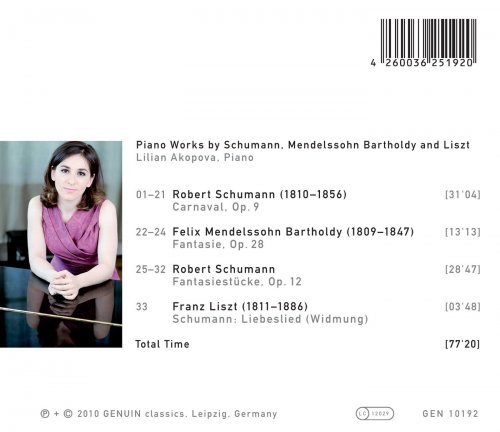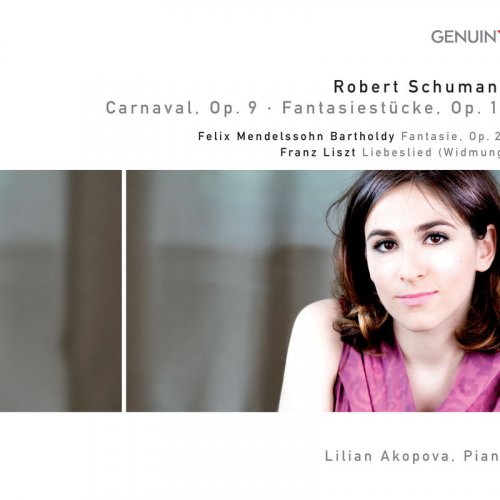
Lilian Akopova - Schumann: Carnaval - Fantasiestucke (2010)
BAND/ARTIST: Lilian Akopova
- Title: Schumann: Carnaval - Fantasiestucke
- Year Of Release: 2010
- Label: Genuin
- Genre: Classical
- Quality: FLAC (tracks+booklet)
- Total Time: 77:06 min
- Total Size: 250 MB
- WebSite: Album Preview

Tracklist:
01. No. 1. Preambule
02. No. 2. Pierrot
03. No. 3. Arlequin
04. No. 4. Valse noble
05. No. 5. Eusebius
06. No. 6. Florestan
07. No. 7. Coquette
08. No. 8. Replique
09. No. 9. Papillons
10. No. 10. ASCH - SCHA (Lettres dansantes)
11. No. 11. Chiarina
12. No. 12. Chopin
13. No. 13. Estrella
14. No. 14. Reconnaissance
15. No. 15. Pantalon et Colombine
16. No. 16. Valse allemande
17. No. 17. Intermezzo: Paganini
18. No. 18. Aveu
19. No. 19. Promenade
20. No. 20. Pause
21. No. 21. Marche des Davidsbundler contre les Philistins
22. I. Con moto agitato: Andante
23. II. Allegro con moto
24. III. Presto
25. No. 1. Des Abends
26. No. 2. Aufschwung
27. No. 3. Warum:
28. No. 4. Grillen
29. No. 5. In der Nacht
30. No. 6. Fabel
31. No. 7. Traumes Wirren
32. No. 8. Ende vom Lied
33. Schumann - Liebeslied, S566:R253, "Widmung"
This young Russian-born, German-trained pianist jumps into a highly competitive fray in what I take to be her recorded debut. She certainly has the technical chops for Schumann’s demanding writing, and a sensitive artistic sensibility that is often very compelling.
Carnaval is mostly very successful, in its combination of clean precision with delicate dynamic and rhythmic nuance (“Préambule” [with an ear-catchingly novel reading of grace notes on, as opposed to before, the beat at bars 31 ff.]; “Papillons”; “Lettres dansantes”; “Reconnaissance”; “Paganini”; “Marche des Davisdbündler”). “Florestan” has both impetuous dash and elegant finesse, and she finds an attractive vein of restrained poetry in “Eusebius” and “Chiarina.” There is an occasional tendency to underplay dynamic contrasts (“Aveu”) and accents (“Arlequin”), as if she is afraid to be too crass about such things. If the result tends toward a more classical view of Schumann than we’re accustomed to, it also makes a refreshing change.
The Fantasiestücke strikes me as altogether less successful, however. Although she’s more than equal to the at-times considerable technical challenges (impressive fingerwork in “Traumes Wirren”), Schumann’s exploration, in this set, of the darker reaches of German Romanticism seems to elude her. Thus “Des Abends” is pallid, very much on the surface, with insufficient traction or resistance in those long-drawn melodic lines. “Aufschwung” is merely neat, with seriously underplayed dynamics and accents in the middle section; “In der Nacht” is fluent and well shaped, but on too even an expressive keel, missing the wildness, flickering half-lights, and phantasmagoria. The technically undemanding “Warum?” is rather square and under-projected. There are good things too: a crisp, elegant “Grillen”; a light, lucid “Fabel”; and a sensitively voiced “Ende vom Lied.”
Mendelssohn’s Fantasy again shows her in a more positive light—an attractively supple reading, understated in the opening Andante, with a wonderful light-fingered fluency to the Presto finale. Liszt’s arrangement of “Widmung” is disconcertingly soft-focused to start with, but rises to a billowing rose-tinted climax.
Altogether plenty to enjoy here, even if my ultimate impression is one of a highly talented and engaging artistic personality that is still not fully developed. I don’t think comparison with other couplings of the two main works is really to the point here; you wouldn’t expect the seasoned individuality of the likes of Marc-André Hamelin (Hyperion) or Juanita Zayas (Music & Arts). But there’s more than enough to make me look forward to hearing more from this young Russian.
Carnaval is mostly very successful, in its combination of clean precision with delicate dynamic and rhythmic nuance (“Préambule” [with an ear-catchingly novel reading of grace notes on, as opposed to before, the beat at bars 31 ff.]; “Papillons”; “Lettres dansantes”; “Reconnaissance”; “Paganini”; “Marche des Davisdbündler”). “Florestan” has both impetuous dash and elegant finesse, and she finds an attractive vein of restrained poetry in “Eusebius” and “Chiarina.” There is an occasional tendency to underplay dynamic contrasts (“Aveu”) and accents (“Arlequin”), as if she is afraid to be too crass about such things. If the result tends toward a more classical view of Schumann than we’re accustomed to, it also makes a refreshing change.
The Fantasiestücke strikes me as altogether less successful, however. Although she’s more than equal to the at-times considerable technical challenges (impressive fingerwork in “Traumes Wirren”), Schumann’s exploration, in this set, of the darker reaches of German Romanticism seems to elude her. Thus “Des Abends” is pallid, very much on the surface, with insufficient traction or resistance in those long-drawn melodic lines. “Aufschwung” is merely neat, with seriously underplayed dynamics and accents in the middle section; “In der Nacht” is fluent and well shaped, but on too even an expressive keel, missing the wildness, flickering half-lights, and phantasmagoria. The technically undemanding “Warum?” is rather square and under-projected. There are good things too: a crisp, elegant “Grillen”; a light, lucid “Fabel”; and a sensitively voiced “Ende vom Lied.”
Mendelssohn’s Fantasy again shows her in a more positive light—an attractively supple reading, understated in the opening Andante, with a wonderful light-fingered fluency to the Presto finale. Liszt’s arrangement of “Widmung” is disconcertingly soft-focused to start with, but rises to a billowing rose-tinted climax.
Altogether plenty to enjoy here, even if my ultimate impression is one of a highly talented and engaging artistic personality that is still not fully developed. I don’t think comparison with other couplings of the two main works is really to the point here; you wouldn’t expect the seasoned individuality of the likes of Marc-André Hamelin (Hyperion) or Juanita Zayas (Music & Arts). But there’s more than enough to make me look forward to hearing more from this young Russian.
As a ISRA.CLOUD's PREMIUM member you will have the following benefits:
- Unlimited high speed downloads
- Download directly without waiting time
- Unlimited parallel downloads
- Support for download accelerators
- No advertising
- Resume broken downloads


